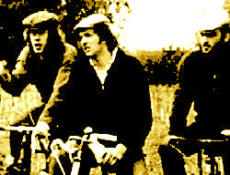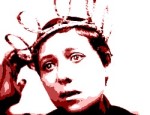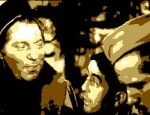Film Review

After working as an editor on films as far back as the mid-1960s, Doillon made his first film in 1971, a short entitled On ne se dit pas tout entre époux which was based on a comic book by Gébé, a well-known cartoonist. Gébé worked closely with Doillon on his next film, L'An 01, adapting another of his popular bandes dessinées which first appeared in print in 1970 in the French weekly magazine Politique Hebdo. The comic strip and the film it inspired superbly capture the mood of the time, in particular that overwhelming desire among the younger generation to overthrow the old order, which was seen to favour a small minority, and return to a more basic way of living in which everyone is free and has an equal claim to the world's resources. From ras-le-bol to Utopia - a cultural revolution in which not one drop of blood or Sancerre would be spilt.
L'An 01 is mostly set in France but it is clear its authors imagine that where the French lead the rest of the world will surely follow (naturellement). There is a cutaway sequence to New York (directed on location by Alain Resnais) in which the latest French revolution is seen to cause a flurry of panic on Wall Street, with ruined financiers leaping to their deaths from their high-rise offices. Word that the capitalist system is about to be overthrown soon reaches Nigeria, in another humorous scene (this one shot by Jean Rouch).
As France comes to a grinding halt and people start throwing their front door keys out of the windows (as their homes now belong to everyone), a party mood overtakes the whole country. Everyone agrees to work less (one day of the week at most) to obtain only that which is essential - the bare necessities of life. Supermarkets are turned into museums, bras and lawn mowers are banned, homes become public spaces and pavements are used for growing vegetables. Occasionally, people get together to remember the bad old days, reliving the old office routine just to remind themselves how much better things are now. In this brave new world, there is not a glum face to be seen anywhere.
In a cast of (literally) hundreds there is an astonishing array of familiar faces - debutant actors, musicians and directors who have since gone on to enjoy very distinguished careers. Josiane Balasko, Thierry Lhermitte, Christian Clavier and Gerard Jugnot all made their screen debut in this film, appearing along with other Café de Paris performers Miou-Miou and Coluche. Gérard Depardieu shows up at the start of the film, a virtual unknown at the time, and Patrice Leconte, Nelly Kaplan and Daniel Prévost all put in a fleeting appearance. Much of the fun of this film is in putting names to the recognisable faces that momentarily pop up.
By the time L'An 01 was released, early in 1973, the spirit of May 1968 was still in the air but was beginning to wane as cellophane-covered consumerism fought back and tightened its stranglehold on the West. With technology offering so many new and exciting marvels, including electrical gizmos to take the drudgery out of life and cheap holidays in faraway climes, the hippy dream could hardly compete. Forty years on, one of the chief concerns of the 'mai soixante-huitards', namely care for the environment, has become a mainstream preoccupation. Year 1 may not have happened in quite the dramatic way that this film depicts but certain aspects of it appear to have come to fruition. As capitalism looks increasingly less viable as a sustainable long-term proposition for humanity, it may well be that the Left Bank Utopia depicted in L'An 01 is much nearer than we think...
© James Travers 2014
The above content is owned by frenchfilms.org and must not be copied.
Film Synopsis
One Tuesday afternoon, the whole of France comes to a total standstill. Everyone stops working and all activity ceases. The old world is finished. A new world is about to begin. After a period of reflection and discussion, only the essential parts of the former regime will be restarted. People will no longer be slaves to capitalism and consumerism. They will live freely, sharing what they have with others, respecting each other and the world in which they live. It is Year 1 of a new age, and where France begins the rest of the world will surely follow...© James Travers
The above content is owned by frenchfilms.org and must not be copied.
Similar Films
Here are some other films you may enjoy watching:- Le Jouet (1976)
- Les Aventures de Rabbi Jacob (1973)
- Les Contrebandières (1968)
- Les Copains (1965)
- The Comedy of Errors (1983)
Other related links:
Film Credits
- Director: Jacques Doillon, Alain Resnais, Jean Rouch
- Script: Gébé
- Cinematographer: Gérard de Battista, Michel Houssiau, William Lubtchansky, Robert Millié, Jean Monsigny, Renan Pollès
- Music: François Béranger, Jean-Marie Dusuzeau
- Cast: Romain Bouteille (Le collectionneur de billets de banque), Cabu (Un conspirateur), François Cavanna (Un conspirateur), Professeur Choron (Un conspirateur), Christian Clavier (Un télespectateur du débat), Véronique K. Colucci (La dactylo), Coluche (Le chef de bureau), Delfeil de Ton (Un conspirateur), Albert Delpy (Le voleur de bijoux), Gérard Depardieu (Un voyageur qui ne prend pas le train), Lee Falk (Le banquier - New York), Jean-Paul Farré (Le pompiste), Marcel Gassouk (Le père du chef de bureau), Marcel Gotlib (Un gardien de prison), Henri Guybet (L'homme qui se reveille à 6 heure), Gérard Jugnot (Un télespectateur du débat), Daniel Laloux (Un publicitaire), Patrice Leconte (Le chauffeur du général), Stan Lee (Récitant), Patrice Minet (Un homme qui joue à travailler au bureau)
- Country: France
- Language: French
- Support: Black and White / Color
- Runtime: 90 min
- Aka: The Year 01
The best French Films of the 1920s

The Golden Age of French cinema

The very best of German cinema
